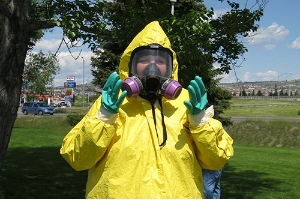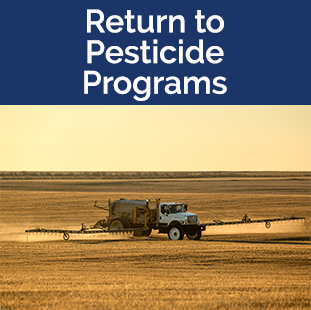Who is protected by the Worker Protection Standards?
 The WPS protects employees on farms, forests, nurseries and greenhouses from occupational exposure to agricultural pesticides and covers two types of employees:
The WPS protects employees on farms, forests, nurseries and greenhouses from occupational exposure to agricultural pesticides and covers two types of employees:
Pesticide handlers - those who:
- mix, load or apply agricultural pesticides;
- clean or repair pesticide application equipment; or
- assist with the application of pesticides.
Agricultural workers - those who perform tasks related to growing and harvesting plants on farms or in greenhouses, nurseries or forests.
Workers include anyone employed for any type of compensation (including self-employed) doing tasks such as:
- carrying nursery stock;
- repotting plants;
- watering; or
- other tasks directly related to the production of agricultural plants on an agricultural establishment.
Workers do NOT include employees such as:
- office employees;
- truck drivers;
- mechanic; and
- any other workers not engaged in worker/handler activities.
Some requirements apply to anyone doing certain tasks, such as handling pesticide application equipment or cleaning or laundering pesticide-contaminated personal protective equipment.
WPS Training Resources
Pesticide Poisoning Information
For information on how to handle a pesticide poisoning, call the National Pesticide Information Center at 800-858-7378 (toll-free to any caller in the United States, Puerto Rico, or the Virgin Islands) .
Some symptoms of pesticide poisoning can be mistaken for symptoms of other illnesses, such as the flu. When pesticide handlers become ill from working with organophosphate or carbamate insecticides in warm and hot environments, it is sometimes hard to tell whether the person is suffering from heat exhaustion or pesticide poisoning. The table below compares the symptoms.
Symptoms of Heat Exhaustion vs Pesticide Poisoning
|
Symptoms of Heat Exhaustion |
Symptoms of Organophosphate/Carbamate (Pesticide) Poisoning |
|---|---|
| Sweating | Sweating |
| Headache | Headache |
| Fatigue | Fatigue |
| Dry membranes | Moist membranes |
| Dry mouth | Salivation |
| No tears | Tears |
| No spit present | Spit present in mouth |
| Fast pulse (slow if person has fainted) | Slow pulse |
| Nausea | Nausea and diarrhea |
| Dilated pupils | Possibly small pupils |
| Central nervous system depression | Central nervous system depression |
| Loss of coordination | Loss of coordination |
| Confusion | Confusion |
| Fainting (prompt recovery) | Coma (can't waken) |
Related Links
- National Pesticide Information Center
- EPA: Occupational Pesticide Safety and Health
- Pesticide Educational Resources Collaborative: Training Resources for the Worker Protection Standard
- Montana Code Annotated (MCA) 80-8: Pesticides
- Administrative Rules of Montana (ARM) 4.10: Agricultural Sciences Division (including Pesticide-related rules)

